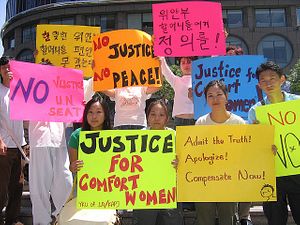A published apology by Japan’s largest and most conservative newspaper, the Yomiuri Shimbun, has again sparked international controversy and pasted the “sex slave” issue across headlines around the world. On Friday, the Japanese edition of the Yomiuri Shimbun apologized and expressed regret for using the term “sex slaves” or similar terminology, and identified 97 articles between 1992 and 2005 in which the language was used.
The apology stated it is “inappropriate” to use the term “sex slave” as such language implies that the Japanese government was implicit in kidnapping and forcing tens of thousands of women – mostly from Korea, China, Taiwan and other Japanese occupied territories – to provide sex for Japanese soldiers during World War II.
An English version of the article published on Monday provided rationale for using the term “sex slave” stating: “The expression ‘comfort women’ was difficult to understand for non-Japanese who did not have knowledge of the subject. Therefore the [Daily Yomiuri], based on inaccurate perception and using foreign news agencies’ reports as reference, added such explanations as ‘women who were forced into sexual slavery’ that did not appear in The Yomiuri Shimbun’s original stories.” From now on, all articles published in the Yomiuri Shimbun will employ the term “so-called comfort women.”
Attempts to whitewash Japan’s wartime atrocities by Japanese politicians, academics, and many within the media are nothing new. Revisionist history has a long and well-documented track record throughout the post-war era. However, with Shinzo Abe’s second stint as prime minister, unapologetic nationalism has been on the rise. For years Abe has tried to undermine and rewrite the 1993 Kono statement, written by then Chief Cabinet Secretary Kohei Kono acknowledging the role the Japanese army played in forcing women into prostitution.
Earlier this year, Abe brought on international condemnation after commissioning a government panel for the explicit purpose of investigating the validity of the Kono statement and to determine if it needed to be revised. In June, after months of intense international and domestic pressure, the panel concluded that the statement was accurate and no changes were necessary. Abe had finally given his stamp of approval on Japan’s official apology for its role in sex slavery. However, the panel also disclosed that the Kono statement was produced only after months of secret negotiations with South Korean officials. The panel’s report also cited diplomatic negotiations containing intense debate on just how much coercion was needed, inferring that many women served in sexual brothels of their own free will. In other words, the panel may have upheld the Kono apology, but in doing so it knowingly provided further ammunition to the political right and revisionist historians to openly question the validity of Japan’s role in wartime atrocities.
Indeed, with the recent apology issued by the Yomiuri Shimbun, some are questioning whether or not the Abe government is employing strong-arm tactics to pressure the media into glossing over wartime atrocities by retracting or revising stories concerning wartime sex slavery.
With all the political dysfunction and economic malaise in Tokyo recently, Abe is in full damage control. The timing of this recent puff of nationalism is curious to say the least. The last thing either Abe or his government needs is to invite further domestic criticism and international outrage.
Ricky Hough is a freelance writer and consultant in Tokyo.

































